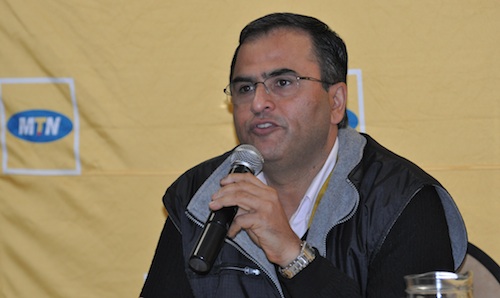
Cellphone network operator MTN SA says it has spent nearly R450m on network investments directly related to the 2010 soccer World Cup, including the roll-out of dedicated infrastructure at all the stadiums to be used during the tournament.
MTN SA chief technology officer Sameer Dave says the company has built additional infrastructure at stadiums to ensure fans can always make phone calls and connect to the Internet and to ensure the connectivity of residents in neighbourhoods next to stadiums are not affected.
At Soccer City in Soweto, for instance, the operator has set up 22 base stations, containing a total of 38 cells and 348 antennae, serving specific zones within the stadium. Similar systems have been installed at OR Tambo International airport, at the new King Shaka airport in Durban and at Cape Town International airport.
The company, which plans to spend R4,1bn on network infrastructure in 2010, will also have engineers on the ground at each of the stadiums to fix any problems that may crop up. There will also be 20 dedicated helpdesk staff monitoring network performance and sending out networking engineering staff when needed.
Where additional capacity is needed on short notice, MTN will send out mobile base stations on trucks, Dave says.
All stadiums have evolved high-speed packet access (HSPA+) base stations capable of theoretical download speeds of up to 21,6Mbit/s. Dave says the backhaul is in place to ensure the highest-possible download speeds are delivered.
“Optimal network capacity has been catered for in line with the capacity of each of the stadiums,” he says.
So far, MTN has deployed 120 HSPA+ high sites countrywide.
Telkom is the primary provider of the backhaul links that connect these base stations into MTN’s core network, though Dave says MTN has also built some of its own backhaul infrastructure using fibre-optic cables and microwave links in cases where Telkom couldn’t deliver on time.
During the World Cup, MTN expects to handle between 20TB and 30TB more data than normal on its network. “We will have to handle between 250TB and 260TB during this period.”
The company will offer 20 000 starter packs to foreign media coming to the country to cover the event. They’ll be able to register in terms of the Regulation of Interception of Communications Act (Rica) at a special MTN media centre helpdesk.
All foreign tourists who have purchased tickets to the World Cup have been give a free Sim card. However, they’ll have to visit an MTN service centre when they arrive in the country and go through the Rica process before they can be connected to the network.
Though not directly related to the World Cup, MTN says it is also migrating its core network from time division multiplexing to packet-based systems using Internet Protocol (IP). This should help reduce costs and improve network efficiency. “We will move to an all-IP network within the next 14-18 months,” Dave says.
MTN is also stepping up the roll-out of its national fibre network. It has lit up 220km of fibre in Gauteng and expects a new fibre link between Johannesburg and Cape Town — which it is building with Vodacom and Neotel — to be ready in about 18 months.
After the World Cup, much of the infrastructure erected at the stadiums will be redeployed elsewhere in MTN’s network, Dave says. — Duncan McLeod, TechCentral
- Subscribe to our free daily newsletter
- Follow us on Twitter or on Facebook

